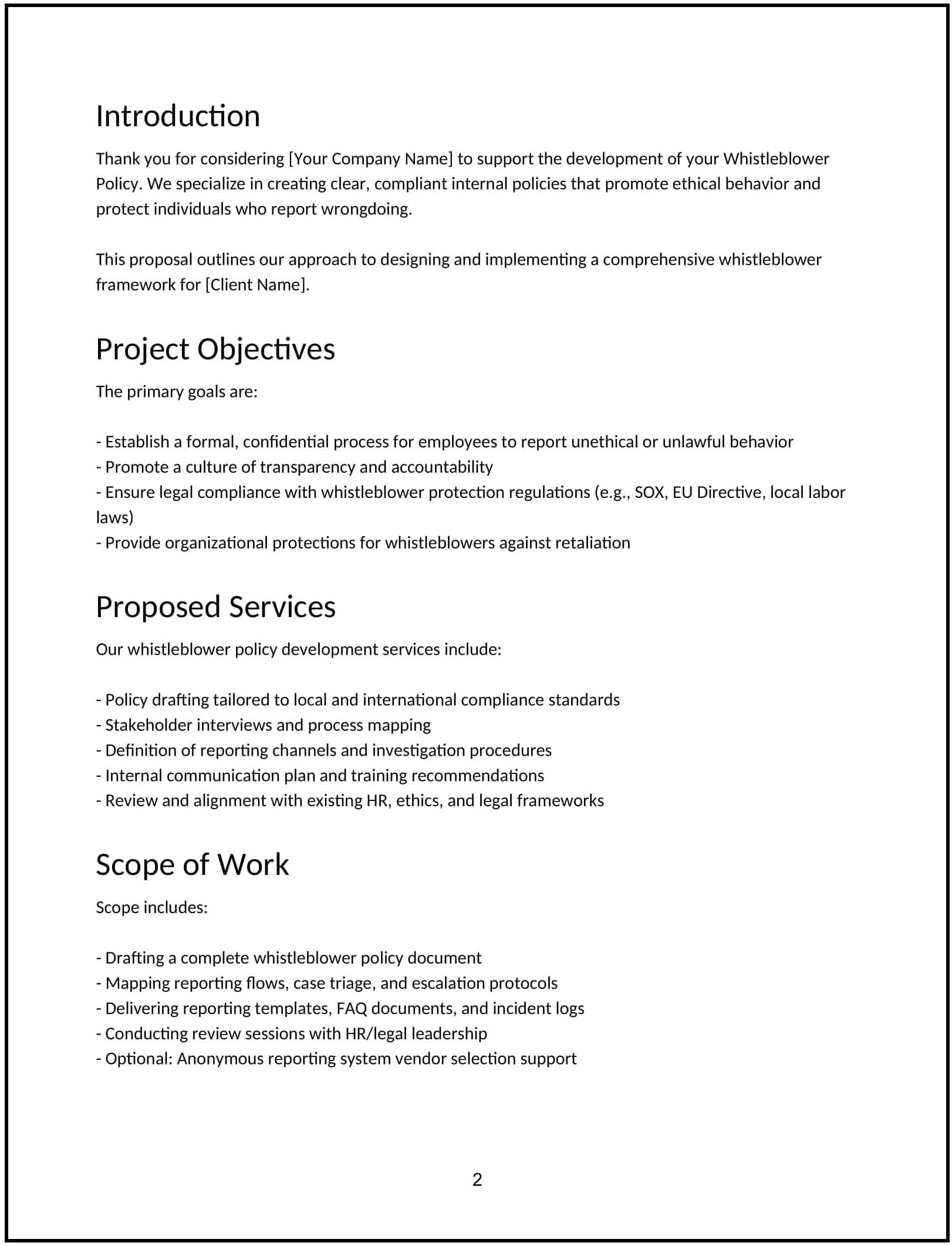Whistleblower policy development proposal: Free template
Got contracts to review? While you're here for proposals, let Cobrief make contract review effortless—start your free review now.

Customize this template for free
Customize this free whistleblower policy development proposal with Cobrief
Open this free whistleblower policy development proposal in Cobrief and start editing it instantly using AI. You can adjust the tone, structure, and content based on your client’s size, industry, and regulatory obligations. You can also use AI to review your draft — clarify your scope, identify missing components, and improve structure before sending.
Once you're done, send, download, or save the proposal in one click — no formatting or setup required.
This template is fully customizable and built for real-world use — ideal for helping businesses build a formal whistleblower framework that supports internal reporting, reduces legal risk, and promotes ethical culture. Whether you’re offering this as a standalone project or part of a compliance program, this proposal helps you communicate your value clearly and professionally.
What is a whistleblower policy development proposal?
A whistleblower policy development proposal outlines how you’ll help a business create a clear and compliant process for employees to report misconduct or concerns. It includes your scope of work, timeline, deliverables, and pricing — and is typically shared after a compliance consultation or risk assessment.
This type of proposal is used by legal consultants, compliance professionals, and HR advisors to help clients meet legal requirements and promote internal accountability. It’s particularly relevant for public companies, government contractors, financial institutions, and growing businesses implementing formal ethics programs.
Unlike general HR or legal templates, this proposal focuses on building a robust internal reporting structure tailored to a business’s unique size, risk profile, and industry.
Why use Cobrief to edit your proposal
- Edit the full proposal instantly: Skip formatting — just open, customize, and send.
- Use AI to tailor your content: Adjust based on industry, size, or legal obligations.
- Run an AI-powered review: Catch vague commitments or missing components before sending.
- Accept suggestions in one click: Apply edits section-by-section or all at once.
- Save, send, or download: Export a professional version in seconds.
When to use this proposal
- When helping a business implement a formal whistleblower program for the first time
- When advising a company on compliance with local, federal, or EU whistleblower protection laws
- When responding to an audit, due diligence request, or internal risk assessment
- When working with a client undergoing rapid growth or structural change
- When bundling this policy with a broader ethics or compliance framework
What to include in a whistleblower policy development proposal
- Project overview: Summarize the goal of the engagement — such as improving internal reporting systems, meeting regulatory standards, or promoting transparency. Tailor this to the client’s risk level and culture.
- Scope of work: List the services you’ll provide — such as policy drafting, escalation process design, training documentation, anonymous reporting setup, and legal review. Clarify what’s included and whether legal research or international coverage is in scope.
- Timeline: Provide a clear schedule — from discovery and policy drafting to internal review, implementation support, and optional training sessions.
- Deliverables: Specify what the client will receive — typically a customized whistleblower policy, reporting procedure documents, implementation guide, and optional presentation or training material.
- Pricing: Outline pricing clearly — fixed fee, hourly rate, or project phase model. Include what’s covered and whether optional add-ons like anonymous hotline setup or ongoing compliance updates are available.
- Call to action / next steps: Close with a clear prompt — approve the proposal, confirm policy scope, or schedule an onboarding meeting. Keep it professional and action-oriented.
How to write an effective whistleblower policy development proposal
- Focus on trust and protection: Highlight how your policy supports both employee confidence and legal defense.
- Tailor based on business risk: The more regulated or public the business, the more detailed the scope should be.
- Clarify responsibilities: Be clear about who will own the implementation and what you’re delivering.
- Emphasize confidentiality and clarity: Clients want policies that are easy to understand and legally sound.
- Balance legal depth with readability: Write in clear, non-legalese language while maintaining authority.
- End with confidence: Always include a direct and professional next step.